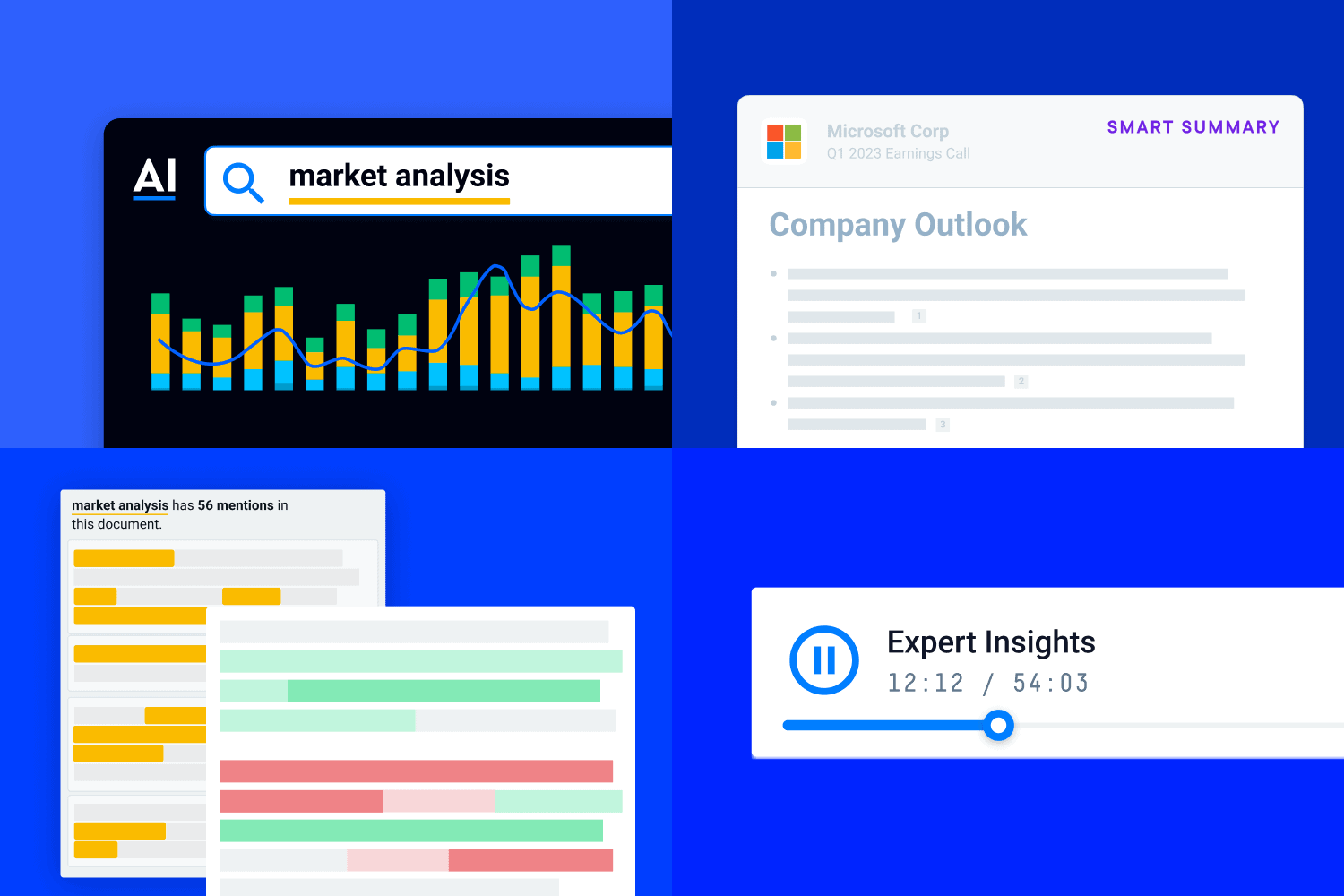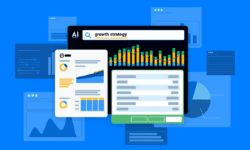In today’s world of limitless data at our fingertips, getting access to information is rarely a challenge for modern professionals. Instead, the real challenge now lies in finding the right kind of information and filtering out the most crucial insights from irrelevant noise—all while avoiding overload.
To stay ahead of new trends, identify risks and opportunities, and gain competitive advantages, you need the ability to conduct deeper market analysis that goes beyond simply consuming information but that helps you make smarter decisions and build better strategies.
Deep market analysis is a key business process for organizations in a diverse set of sectors:
- Financial services and investors use it to monitor trends, build smart investment strategies, and optimize portfolio performance.
- Consulting firms use it to provide confident, accurate, data-driven solutions for clients.
- Corporate teams use it to maintain ongoing market and competitive intelligence.
And yet, not all market analysis is created equal. To be at the top of your industry and ahead of your biggest competitors, you need to be performing deep market analysis that goes beyond standard market research practices. This kind of analysis leverages artificial intelligence (AI), automation, and advanced research capabilities to deliver insights that drive strategic action.
In this guide, we’ll take you through the process of conducting deep market analysis, including the tools and technologies that will help you do so most effectively.
The Right Content For Deeper Market Analysis
Deep market analysis means obtaining the full picture of the market landscape from every perspective. In corporate and financial market research. These are the four key perspectives:
- Company
- Analyst
- Journalist
- Expert
The Company Perspective
The company perspective includes all documents coming straight from the company about the company—10Qs, earnings calls, press releases, ESG reports, presentations, and company filings. This perspective informs deep market analysis by helping you:
- Evaluate how companies are performing
- Get behind-the-scenes insight on company leaders’ strategic thinking
- Understand why certain events or changes occurred
- Uncover competitive strategies and future plans
In deep market analysis, this content set is critical. It gives you an inside look into the company you’re interested in, which you can’t get when you only rely on third-party commentary and reporting.
The Analyst Perspective
The analyst perspective encompasses equity research published by expert industry analysts who rely on their years of experience and deep knowledge of particular markets to provide insight. Content that provides an analyst’s perspective includes company reports, market reports, industry reports, and the like.
These in-depth documents can help you as the researcher to:
- Deep-dive into particular topics, companies, or industries
- Get an objective perspective on market and company events
- Access deeply analytical insights on a particular subject
- Understand industry sentiment about a company or topic
Broker research is important for deep market analysis for two reasons: it is one of the most objective sources of information, and it contains high-level insights you won’t find in any public source content. Hence, this content set is one of the best ways to differentiate your research and gain a competitive advantage.
The Journalist Perspective
The journalist perspective can be found in content published in news and trade journals as well as in government and NGO publications. Like analyst reports, content from the journalist’s perspective can help you understand wider market perceptions and attitudes toward companies, industries, or trends.
This content set is differentiated by its more commentative approach. While analyst content leans heavily analytical, and company content also usually adheres to a standard format, journalist content is much more off-the-cuff and opinionated. This perspective is crucial as public perception plays a significant role in a company’s ability to succeed, grow, and pursue opportunities. Through this perspective, you can glean deep insight into a company’s reputation and notoriety. Further, public perception and media coverage impacts the quality of any company or market from an investor’s point of view.
Finally, trade reports and government/regulatory documents are integral for gaining a deep understanding of certain industries. Having a market analysis tool that allows you to quickly and easily uncover the most key insights in these notoriously long-winded and dense documents is a serious asset.
The Expert Perspective
The expert perspective includes largely exclusive firsthand accounts from experts with direct experience in a company or industry. Experts can include former employees, partners, competitors, customers, and more. These are people who are able to speak from personal experience about specific topics, companies, or industries—without bias or ulterior motives.
Part of deep market analysis is incorporating primary research into your research process. The expert perspective is particularly important for this aspect of deep market analysis because it provides access to unique and differentiated primary insights not found anywhere else. Like company documents, expert insights provide information straight from the source. But unlike company documents, which always have the goal of putting a company’s best foot forward and are limited in what they will discuss, experts are able to speak much more freely, openly, and honestly.
Because expert perspective content usually comes from people no longer directly involved or who don’t have a stake in the success of a company or industry, their insight is more objective. It mostly comes in the form of expert interviews, like those found in AlphaSense’s Expert Insights library.
Using the Four Perspectives: An Example
The best way to conduct deep market analysis that includes the four perspectives is to use a market intelligence tool that offers leading research content in a centralized platform. Let’s walk through how a researcher might do this using AlphaSense.
For this example, suppose you’re interested in learning more about OpenAI’s ChatGPT and how it may or may not be disrupting the search engine market. An initial search on AlphaSense yields more than 6,000 documents on this topic, including:
- 54 expert calls
- 69 transcripts
- 228 company documents
- 5,829 news sources
As a first step, you might dive into the company documents to see how OpenAI is positioning ChatGPT’s activity in the search engine space. Under this filter you’ll find press releases from OpenAI and its partners discussing the launch of ChatGPT-powered search engine alternatives to Google (like this SEO agency’s Search.co platform) and plugins to enhance purpose-specific search (like this one to help users find affordable flights).
Next, you might move to the journalist’s perspective. Under this filter you’ll find a variety of journalist analyses directly comparing ChatGPT vs. Google or analyzing its transformative power in the search industry. From these sources, you can quickly gather that OpenAI is being taken seriously in its search endeavors.
Still, you want to confirm your findings by looking at what industry experts are saying about ChatGPT. Filtering search results by expert documents, you come across an interview in which an industry expert says ChatGPT has already surged past its competitors and that even Google is struggling to keep up in some areas. With this confirmation, you can conclude that ChatGPT is certainly a serious industry player and that OpenAI is a company to watch if you are interested in themes like generative AI (genAI), search engines, and technology innovations.
Finally, you want to round out your research by looking at analyst reports discussing ChatGPT and predictions for the evolution of genAI. When you filter for research documents, you now have 450 reports to browse, all of which analyze ChatGPT’s future potential in the search engine industry and how it will change the market landscape.
In just a few simple steps, you’ve gained comprehensive high-level insight and obtained hundreds of documents to inform deeper market analysis.
Speed Up Your Time to Insight With Artificial Intelligence
The key to the above-outlined process is artificial intelligence. While AI isn’t technically necessary to do a deep market analysis, it’s impossible to achieve the same scope and quality of results without it. AI saves researchers hours (or more) of time spent curating and reading through documents, allowing them more time to strategize and analyze.
On the AlphaSense platform, AI powers key search capabilities such as:
Semantic Search
AlphaSense’s smart AI search technology recognizes the intent behind your search. It delivers insights that prevent you from having to perform multiple manual searches, or spend time combing through the entirety of long, hard-to-read documents.
Our Smart Synonyms™ technology analyzes speech patterns across tens of millions of search documents and uses a robust library of synonymous words. It ensures you never miss a critical insight and that the content delivered for any given search is hyper-relevant to your research goals.
Sentiment Analysis
AlphaSense’s sentiment analysis technology uses Natural Language Processing (NLP) to uncover market perceptions about any topic. It color-codes positive and negative sentiment for easy recognition as you browse search results, and it provides sentiment scores that allow you to instantly understand how a general audience perceives a company or topic, as well as how this perception has shifted over time.
This analysis takes mere seconds, saving analysts hours previously spent manually parsing through earnings call transcripts and trying to decipher the underlying meaning and nuance beneath the surface of the text.
Generative AI
Unlike other genAI tools focused on consumer users and trained on publicly available content across the web, AlphaSense takes an entirely different approach. As a platform purpose-built to drive the world’s biggest business and financial decisions, Smart Summaries leverages our 10+ years of AI tech development and draws from a curated collection of high-quality content.
With Smart Summaries, you can:
- Glean insights at-a-glance on complex and comprehensive topics to quickly capture high-level insights and direct the next steps in your research process
- Uplevel your earnings season workflow with instant summarizations of earnings transcripts
- Quickly capture company outlook
- Understand the expert SWOT perspective
Key Steps in Conducting Deeper Market Analysis
Search Across Curated, Premium Content on a Centralized Platform
Start by mapping the market with a simple keyword search. Going back to our previous OpenAI and ChatGPT example, we might use general search terms like “search engines” and combined keywords like “ChatGPT and search.”
AlphaSense’s Smart Synonyms™ technology will instantly search across millions of content sources to find all mentions of this term and all related synonyms, while filtering out extraneous noise from your search results. From these results, you should be able to get a great overview of key players, competitors, events, and market trends pertaining to your topic of interest.
Define the Landscape
Armed with these initial insights, you can start to define the market landscape. One smart way to do this is by splitting up results into distinct buckets. In our ChatGPT example, we might start categorizing content by ChatGPT partners vs. competitors.
You can also amend your search by adding in key additional phrases that come up frequently in your initial search results, zeroing in on important details. You can look for positive or negative sentiment across key documents to get an idea of how the market views particular players or events.
Filter Content Using the Four Perspectives
Next, perform deeper searches according to the four primary research perspectives we covered earlier. In the ChatGPT example, we saw general agreement that ChatGPT is an emerging leader in the search engine industry. Other topics and markets may not see such straightforward results. When you see any disparities in how different groups are viewing a market or company, dig deeper to figure out why.
Use GenAI to Identify Key Trends
As you move through the steps above, be sure to document the most important trends and insights you come across in your search results. These are the topics you’ll want to dive deeper into once you have your high-level market overview complete.
Generative AI features, like AlphaSense’s Smart Summaries or our Trending Topics tool, can help you do this efficiently. They give you at-a-glance insights that facilitate a 360-degree understanding of a market and set the direction of your further research.
Dive Deeper Where Needed
Deep market analysis requires getting to the very bottom of every important trend and aspect of the market you’re analyzing. By this point in the process, you’ve likely identified subtopics, trends, and other keywords you need to explore further.
Take time to perform deeper dives on these topics, using the AlphaSense features we’ve covered to streamline your research as you go.
Summarize Your Findings
Summarize your findings into a cohesive report you can use to share insights with your team and make relevant decisions using your research. Use AlphaSense features like in-platform notes and Excel export to keep your research insights organized so you won’t have to start this step from scratch.
Application Programming Interface (API) capabilities provided by AlphaSense allow you to build your own tools to get maximum return on investment (ROI) from the content sources you can now access. For example, AlphaSense offers the following APIs for users to leverage our proprietary technology and content across other parts of their strategies:
- Alert Feed API – Real-time data feed based on saved searches and alerts.
- Search API – Solution that provides real-time, programmatic access to the AlphaSense search infrastructure to query and filter the database of documents from a third party domain.
- Ingestion API – Integration, processing, and enrichment capabilities for internal or custom content sets.
- AI API – Enrichment capabilities that enable company recognition, sentiment, themes and KPI services for internal content.
AlphaSense integrates with applications you already use (i.e., Sharepoint, OneNote, and Box) to increase your productivity and enable you to effortlessly collaborate with your team. Our integrated workflow tools allow venture researchers to capture valuable insights and expand upon them with our notebook, table tools, highlighting, annotation, and image search capabilities.
Set Up Real-Time Alerts to Monitor Updates
Finally, remember that deep market analysis is rarely a one-and-done process. Once you’ve completed your analysis and generated a report, set up automated alerts to receive new updates in real-time, and ensure your strategies are built on the latest insights.
Uplevel Your Market Analysis With AlphaSense
With AlphaSense’s vast content universe and advanced search technology, you can conduct deep, comprehensive, and accurate research—all while saving time and resources for higher-value tasks.
Today, AlphaSense powers deep market analysis capabilities for leading organizations around the world, including 85% of the S&P 500, 75% of the world’s leading asset management firms, and 80% of the top consultancies.
Start your free 2-week trial today to explore the AlphaSense platform firsthand and see how it can help your organization transform.








